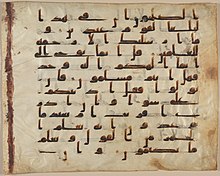
Back Surat Al-Anbiya' ACE Al-Anbiya Afrikaans سورة الأنبياء Arabic سورة الأنبياء ARZ আল-আম্বিয়া Assamese Сура Ал-Анбийаъ AV Ənbiya surəsi Azerbaijani انبیاء سورهسی AZB Әл-Әнбиә сүрәһе Bashkir সূরা আম্বিয়া Bengali/Bangla
| الأنبياء Al-Anbiyā The Prophets | |
|---|---|
| Classification | Meccan |
| Position | Juzʼ 17 |
| Hizb no. | 33 |
| No. of verses | 112 |
| No. of Rukus | 7 |
| No. of words | 1323 |
| No. of letters | 5,094 |
| Quran |
|---|


Al-Anbiyaʼ[1] (Arabic: الأنبياء, ’al-’anbiyā’; meaning: "The Prophets")[2] is the 21st chapter (sūrah) of the Quran with 112 verses (āyāt). Its principal subject matter is prophets of the past, who also preached the same faith as Muhammad.
Regarding the timing and contextual background of the revelation (asbāb al-nuzūl), it is a "Meccan surah", which means it is believed to have been revealed in Mecca, instead of later in Medina. It was revealed around 2-3 years before Hijrah, in a later stage of Muhammad preaching in Mecca.
- ^ Ibn Kathir. "Tafsir Ibn Kathir (English): Surah Al Anbiyah". Quran 4 U. Retrieved 18 March 2020.
- ^ Haleem, Trans. M.A.S. Abdel (2010). The Qur'an (Oxford World's Classics). New York: Oxford University Press.
